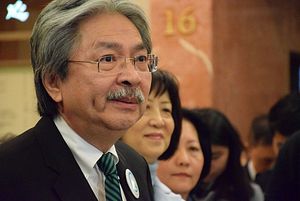On March 26, Hong Kong will choose its next chief executive. In December 2016, the city’s current but unpopular leader CY Leung announced that he would not seek re-election just two days ahead of polls for the Election Committee, the 1,200-member body charged with electing the next chief executive. Leung’s unexpected early departure was widely seen as a sign that Beijing may change its hardline approach toward Hong Kong, despite Leung’s recent promotion to the vice chairmanship of the Chinese People’s Political Consultative Conference.
But his withdrawal failed to prevent the pro-democracy bloc from seizing more than a quarter of available seats in the Election Committee. Most won by a landslide in the professional sectors, including in some traditionally Beijing-friendly subsectors like architecture and accountancy.
On the one hand, this record-breaking result dramatically reduces the number of votes that Beijing can sway. But on the other, it emboldens the pro-democracy camp, which might play a decisive role in the outcome of Hong Kong’s leadership contest. In principle, the camp can field at most two aspirants from its side. But in practice, the opposition is adopting a novel strategy of ‘selecting a lesser evil’ against the backdrop of a rigged election. The pan-democrats plan to side with a pro-Beijing underdog against the leading horse in the hopes of maximizing the electoral competitiveness of the closed system.
Complicating Beijing’s calculation is the attitude of some 220 returned electors who supported Henry Tang in the last chief executive election. An internal divide within the pro-establishment camp was the main reason why Leung scored only 689 votes in 2012, the lowest proportion for a winning candidate in a chief executive race. Whether this group of committee members is willing to back Carrie Lam, who is now seen as Beijing’s preferred candidate but has been dubbed “CY 2.0,” is questionable. Instead, former financial chief John Tsang may fit their interests more because of his faith in laissez-faire economics.
Beijing is reportedly at pains to secure majority support for Lam by lobbying its disobedient puppets. Lam has bagged 580 nominations under the auspices of Beijing’s liaison office whereas Tsang has only exacted 35 entry tickets from the business sectors, with the other 125 nominations he submitted coming from the anti-government side. Lawmaker Regina Ip is a victim of the rather crowded field, falling short of the 150 nominations required to formally qualify as a candidate. Despite her long-term loyalty to Beijing, her failure to enter the race portends how restrictive the “8.31” framework – Beijing’s ultimatum for party-managed elections – would be if applied to future elections.
Unlike the nomination process, the final vote will be by secret ballot. This means that those alleged Lam supporters could turn against Beijing’s choice. In short, the central government is worried about the uncertainty of the business elites and those 300-odd pan-democratic electors voting en bloc for Tsang, a candidate who is running a “red light.” The worst scenario could be that no candidate secures 601 votes, the minimum for a winner to be declared.
While all eyes are on whether the opposition can upend the scripts pre-written by the Xi-led Politburo, the radicals dismiss the idea of shoring up for Tsang. For them, such a move may enhance rather than weaken the legitimacy of the small-circle election and non-democratic government writ large. Active engagement with the pro-establishment figures may also run the risks of co-option.
Such caution is not groundless. Given that Beijing has a final say over the chief executive appointment, those who are vying for the top job tend to be conservative to earn its trust. This partly explains why the three candidates have said little on political reform thus far, despite pressing demands for full democracy.
Lam is unsurprisingly avoiding promises to restart the reform that failed in 2015. But even the pan-democrat preferred candidate Tsang suggested that the electoral reform initiative should be relaunched in tandem with controversial proposals to implement Article 23 of the Basic Law. Article 23 was the catalyst that triggered more than 500,000 people to take to the streets in 2003.
Retired judge Woo Kwok-hing is the most democratic candidate among the three. While he pocketed 180 nominations from the opposition, his incremental approach of democratization, which recommends a 15-year realization of universal suffrage in both the executive and legislature branches, disappoints many democratic activists.
Amid Beijing’s heavy-handed interference, the differences in the candidate’s public finance philosophies have also been overlooked. This was supposed to be another main axis of the election.
Last but not least, a series of deep-seated problems in the city, including mutual mistrust between the central government and the Hong Kong people, the rise of localism, widening inequality, and high property prices will not vanish after the end of the election. Nor would a change of government automatically result in effective governance. If the Beijing authority continues to run a shallow election, picking a “lesser evil” is just another façade.
Steven Yet is a PhD student in the Department of Political Science, University of Toronto.

































